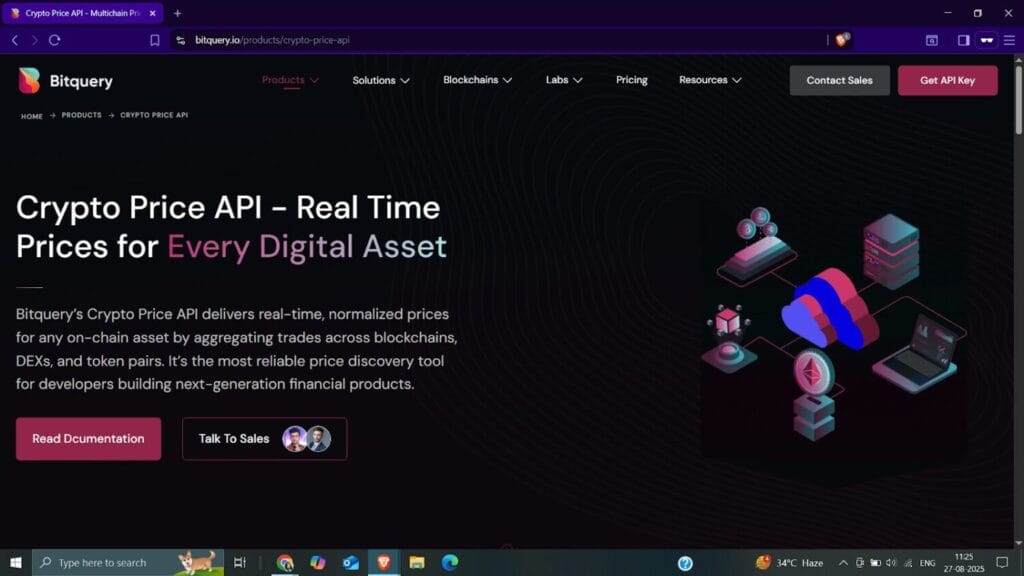For years, CoinGecko has been a trusted provider of crypto market data through its API. It offers token prices, market capitalization, and historical charts, making it a common choice for developers and businesses. However, as the digital asset ecosystem matures in 2025, data requirements are shifting. Builders now expect high-quality, real-time, chain-agnostic data that goes beyond simple snapshots of market activity.
This has created demand for alternatives that deliver data with speed, accuracy, and reliability. Below is a review of the best CoinGecko API alternatives in 2025.
Table of Contents
1. Bitquery

Bitquery, which is popularly known as a blockchain data provider, has expanded its suite to focus on traders and the tools designed for them. This includes the Crypto Price APIs and streams that offer low-latency data with 1-second OHLC (K-line), volume, SMA, etc., built across chains.
For example, You can make a 1 API call and get the price and volume of Bitcoin and its bridged versions across Tron, Solana, Ethereum, and BNB.
This means it provides context-aware crypto price information for traders, wallet information for custodians, regulators, APIs, and enterprise products for developers.
Key Features of the Bitquery Crypto Price API
Chain-Agnostic 1-Second OHLC: Pre-aggregated OHLCV, SMA, EMA, WMA, and mean price across 40+ blockchains. TradingView SDK is available for easy charting.
Plug and Play TradingView Charting: With a 1-second K-line stream and TradingView SDK you can add charts to your application easily.
Cross-Chain Price Aggregation: Through its Currency Cube, Bitquery unifies token variants such as WBTC, cbBTC, and BTC on Layer 2 networks into a single asset price.
Real-Time Streaming: GraphQL and Kafka streams for low-latency data delivery.
Support for Complex Queries & Calculations: The API suite supports all arithmetic and database functions within the query itself, so you can stream derived metrics for any on-chain data point.
Custom Pricing for Value: Their pricing structure does not limit the amount of data and is built based on customer requirements. Enterprises can pick and choose the chains and access modes they want with no limit on the data.
2. CoinMarketCap API
Best for: Market rankings and exchange coverage
Owned by Binance, CoinMarketCap (CMC) remains one of the most recognizable names in crypto data. Its API is widely used in consumer-facing apps, trading platforms, and retail dashboards.
- Features: Token prices, historical charts, market capitalization, liquidity rankings, and exchange metrics.
- Strengths:
- Very broad token and exchange coverage.
- Reliable for CEX-driven data.
- Simple to integrate for apps that want exchange-centric feeds.
- Very broad token and exchange coverage.
- Limitations:
- Primarily focused on centralized exchanges, meaning limited visibility into DEX trading or on-chain activity.
- Slower to reflect emerging tokens that gain traction first on DEXs.
- Primarily focused on centralized exchanges, meaning limited visibility into DEX trading or on-chain activity.
Use case: Ideal for retail dashboards, exchange monitors, and apps that want aggregated CEX data. Less suited for developers building on DeFi or cross-chain ecosystems.

3. Messari API
Best for: Institutional research and fundamentals
Messari is unique because it combines data + research. Its API gives developers access to token metrics, profiles, and governance data alongside quantitative information.
- Features: Token fundamentals, governance updates, curated research metrics, and market data.
- Strengths:
- Focused on quality, curated data.
- Useful for institutional research teams.
- Governance and token profile data are unavailable in most APIs.
- Focused on quality, curated data.
- Limitations:
- Less emphasis on raw price feeds or trading granularity.
- Not designed for high-frequency trading or streaming feeds.
- Less emphasis on raw price feeds or trading granularity.
Use case: Perfect for research desks, asset managers, and analysts who care more about token fundamentals and governance than second-by-second price updates.

4. Kaiko API
Best for: Centralized exchange order books and liquidity analysis
Kaiko has built a strong reputation as an institutional-grade provider of CEX trading data. It specializes in order book snapshots, liquidity data, and tick-level trade history.
- Features: Real-time and historical order book data, trade data, aggregated liquidity metrics.
- Strengths:
- Excellent for quantitative strategies and market microstructure analysis.
- Strong focus on centralized exchange reliability.
- Excellent for quantitative strategies and market microstructure analysis.
- Limitations:
- Limited to CEX data — does not cover on-chain or DEX activity.
- Not designed for chain-agnostic price aggregation.
- Limited to CEX data — does not cover on-chain or DEX activity.
Use case: Quant funds, institutions, and researchers who care about order book depth, bid-ask spreads, and CEX liquidity.

5. Glassnode API
Best for: On-chain adoption and investor behavior
Glassnode is widely respected for its on-chain behavioral metrics. Rather than focusing exclusively on price, it analyzes wallet cohorts, token flows, and adoption signals.
- Features: Wallet activity, address cohorts (short-term vs long-term holders), token flows, and adoption metrics.
- Strengths:
- Excellent for sentiment analysis.
- Strong reputation in on-chain research.
- Excellent for sentiment analysis.
- Limitations:
- Not a full-price API — better suited as a supplementary dataset.
- Does not deliver low-latency OHLC feeds.
- Not a full-price API — better suited as a supplementary dataset.
Use case: Investor dashboards, research firms, and analysts tracking adoption and sentiment.

6. Sentora API
Best for: Adoption signals and behavioral analytics
Like Glassnode, Sentora specializes in insights beyond price. It provides wallet adoption signals, token flow data, and usage analytics.
- Features: Adoption metrics, token usage signals, sentiment indicators.
- Strengths:
- Simple to integrate into dashboards.
- Focused on token-specific behavioral analytics.
- Simple to integrate into dashboards.
- Limitations:
- Not a comprehensive price API.
- Best used alongside another provider.
- Not a comprehensive price API.
Use case: Token adoption studies, retail analytics dashboards.

7. Nansen API
Best for: Whale tracking and wallet intelligence
Nansen has made its mark by labeling wallets and tracking smart money. Its API allows developers to build dashboards around capital flows, whale movements, and liquidity monitoring.
- Features: Wallet intelligence, whale flows, and on-chain capital tracking.
- Strengths:
- Powerful for identifying market trends early.
- Popular among traders and fund managers.
- Powerful for identifying market trends early.
- Limitations:
- Not a pricing-focused API.
- Lacks chain-agnostic OHLC feeds.
- Not a pricing-focused API.
Use case: Whale monitoring dashboards, alpha generation tools.

8. Alchemy API
Best for: dApp developers integrating blockchain + price feeds
Alchemy is one of the most popular Web3 infrastructure providers. Its primary value is node access, but it also includes APIs for token balances, NFT data, and prices.
- Features: Price endpoints, NFT metadata, wallet balances, Web3 developer tools.
- Strengths:
- One-stop shop for dApp developers.
- Trusted by many startups and indie projects.
- One-stop shop for dApp developers.
- Limitations:
- Price data is secondary — not as robust as Bitquery or Kaiko.
- Not suited for institutional-grade use cases.
- Price data is secondary — not as robust as Bitquery or Kaiko.
Use case: Ideal for dApp developers who want infrastructure + data feeds in one package.

9. Moralis API
Best for: Multi-chain dApps and NFT projects
Moralis is developer-friendly and known for simplifying multi-chain integrations. Its API provides price data alongside NFT and wallet endpoints.
- Features: Wallet data, NFT endpoints, token price feeds.
- Strengths:
- Extremely easy to integrate.
- Strong community adoption among indie developers.
- Extremely easy to integrate.
- Limitations:
- Narrower scope and depth compared to Bitquery or Kaiko.
- Not designed for large-scale institutional platforms.
- Narrower scope and depth compared to Bitquery or Kaiko.
Use case: Indie projects, NFT marketplaces, and lightweight multi-chain dApps.

10. Cryptocompare API
Best for: Historical data and market visualization
Cryptocompare has been around for years and is known for its historical datasets and charting-friendly endpoints.
- Features: Historical price data, aggregated market feeds, and visualization-friendly APIs.
- Strengths:
- Rich historical data for backtesting.
- Easy integration with analytics and visualization tools.
- Rich historical data for backtesting.
- Limitations:
- Focused more on history than real-time.
- Less relevant for DeFi-native tokens.
- Focused more on history than real-time.
Use case: Researchers, backtesting engines, and charting applications.

Why Bitquery Stands Out Among CoinGecko Alternatives
When evaluating CoinGecko competitors in 2025, it becomes clear that most alternatives specialize in one dimension of crypto data. Bitquery is different. It provides:
- Universal Price Feeds: Chain-agnostic OHLCV and real-time prices.
- Advanced Analytics: Whale ratio, liquidity asymmetry, and sentiment metrics.
- Real-Time Streams: Sub-second data delivery for trading and dashboards.
- Cross-Chain Coverage: Unified asset pricing across multiple chains.
- Data Observability: Transparent and traceable blockchain data pipelines.
This combination positions Bitquery not just as an alternative, but as the upgrade developers and enterprises need for crypto trading platforms, DeFi apps, financial dashboards, and institutional research.
Final Thoughts
CoinGecko remains a popular choice for quick market data, but the future of crypto development requires richer, faster, and more transparent APIs. Alternatives such as CoinMarketCap, Messari, Kaiko, Glassnode, and Nansen each provide niche value.
However, Bitquery offers the most comprehensive solution. Its Crypto Price API, real-time streaming capabilities, and on-chain observability make it the leading CoinGecko API alternative for 2025.
Explore the Bitquery Crypto Price API and start building with next-generation blockchain data today.










